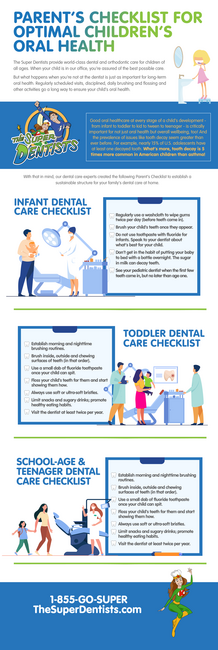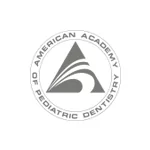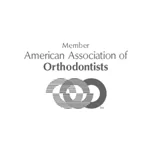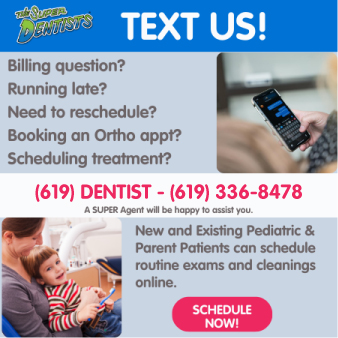The Good Parent’s Checklist to Good Dental Health for Kids in 2022
Good dental health for kids starts with good habits at home. Parents and guardians play a crucial role in developing positive, healthy behaviors at a young age – and that’s important for robust, lifelong well-being. The Super Dentists created this dental checklist for parents to encourage, promote and positively reinforce good dental hygiene for kids. As we’ll you’ll see, the imprint parents make on their children at a young age can make a world of difference down the road for the better – and not just for oral health, but for their overall health as well! 
Steering your children toward positive oral healthcare isn’t without its share of hazards, however. The potential pitfalls (like child tooth fillings due to cavities) are considerable, and present significant challenges to any parent or provider looking to promote excellent dental health. These oral health hurdles impact all ages of childhood, from infants and toddlers to school-age children and teenagers. Regardless of your children’s current age(s), you have to be their #1 advocate and support system when it comes to reliable, sustainable dental health habits.
Here are just a few concerns that can detract from strong dental health habits for kids:
- Negative reinforcement: Away from home, children are bombarded with a multitude of subliminal messages, particularly as they relate to good oral health care. From sugary snacks to fast food and more, it’s tough for parents to encourage teeth and gum care when unhealthy food and drink is everywhere. About those sugary snacks…
- Sugar, sugar, sugar: This one’s so important, we had to say it three times. The amount of sugar (and preservatives) in our food has skyrocketed in the past few generations. This increase in sugar consumption is tied to gum disease, cavities and other oral health care issues for children. Limit your children’s sugar intake, including both hard substances (like candy) and soft drinks. Sugar in juice, formula and milk can also lead to tooth decay in toddlers and infants.
- General apathy: Let’s face it: most kids aren’t enthusiastic about teeth and gum care. But as you’ll see in this dental checklist, there are ways to counteract carelessness with common sense habits to encourage good dental health. It all starts with you – as your children’s parent or guardian, you and your family dentist are their best dental health guides!
The Super Dentists are San Diego’s #1 dental health network for families. We have the professional dental services, exceptional patient care and cutting-edge technology to help you and your family achieve superior oral health. It can be challenging to keep your kids’ teeth strong and healthy. That’s one of the primary reasons we created this dental checklist and dental health guide. Remember, you’re not alone – The Super Dentists are here to help!
The Importance of Disciplined Dental Health for Kids
The benefits of good dental health habits go far beyond your child’s teeth and gums. Recent studies have shown a strong correlation between oral health and overall health. If your child’s teeth and gums aren’t in good health, there’s a good chance the rest of the body won’t be healthy. That’s why it’s so important to promote and encourage a dental checklist for kids.
Poor dental health is associated with the following disorders and diseases:
- Diabetes
- Cardiovascular disease
- Obesity
- Insulin resistance
- Respiratory disorders (including asthma)
- Osteoporosis
- Alzheimer’s disease
- Pregnancy complications
- And many more
Researchers think the link between poor oral health and other disorders is due to bacteria in the mouth. This usually isn’t a problem – bacteria (good and bad) is always in the mouth – but these bacteria can more readily enter the bloodstream and spread illnesses and viruses if the gums are compromised. Bleeding gums and receding gums are telltale signs that other health problems may be imminent – if they’re not happening already.
For these reasons alone, it’s in any parent’s best interest to encourage healthy dental habits.
Dental Checklist to Keeping Their Kids Teeth Safe in 2022
Aside from your dentist, you are your child’s #1 dental health guide. Here are some recommended dental healthcare tips for all stages of childhood. Use our dental checklist from infancy through the teenage years.
Infants
- Clean your baby’s gums with gauze or a warm washcloth before the first teeth arrive.
- After feedings, wipe the gums with gauze or warm washcloth.
- Don’t give your baby a pacifier dipped in sugar or sweet liquids.
- Hold off using fluoride toothpaste until your baby is at least 24 months old.
- Schedule baby’s first dental visit by no later than six months. Your dentist will review important oral healthcare needs for the transition from infant to toddler.
Toddlers
- Show your toddler how to brush their teeth by setting an example.
- Use only a soft bristle toothbrush with a flexible head.
- Use a small amount of fluoride toothpaste.
- Work inside to outside. Start with inner teeth surfaces first, with bristles angled toward the gum line.
- Brush the teeth chewing surfaces last.
- Ensure your toddler doesn’t swallow any toothpaste.
- Start the brushing and flossing routine early. Pick a consistent time for example, 15 minutes before bed every night, for your toddler to brush their teeth.
- Begin a regular flossing routine. Flossing before brushing is a good idea, as dislodged food particles can be washed away during brushing.
- Use a waxed, child-friendly floss.
- Schedule twice-yearly dental appointments with your dentist. Some toddlers are more susceptible to cavities and other oral health disorders, and your dentist can help ensure superior dental care during this crucial time.
- Implement a reward system. Toddlers respond well to positive reinforcement. Provide small rewards, like reading an extra story with them for brushing their teeth every night.
Children
- Continue to schedule regular dental appointments and pediatric dental check-ups.
- Provide healthy snacks for school lunches. Possibilities include celery with cream cheese, nuts, Greek yogurt with berries, and salads.
- Limit sugar consumption. Easier said than done, but children ages 5-12 will develop harmful snacking habits without proper guidance.
- Buy a new toothbrush every three months. Let your child pick out the color or design, but continue to use a soft bristle toothbrush.
- Pay attention to dental care advisories regarding certain school activities and sports. If necessary, have your child fitted for a mouth guard.
- Watch out for juices and soft drinks! Children love these sweet substances, but they’re a primary cause of tooth decay, gum disease and other oral health hazards. Go with water and non-sweetened drinks instead.
- Keep track of daily brushing habits. Your child should brush once in the morning and once at night, at a minimum.
- Settle on a schedule. Similar to toddlers, tying brushing habits to bedtime is a good idea to create a routine for them.
- Pay attention to teeth alignment. Many kids will require braces, so make an appointment with an orthodontist by no later than age 7, to ensure optimal dental health. Orthodontists should see your child while their jaw is still developing to proactively troubleshoot issues.
Teenagers
- Stay on track. The positive habits your children have built from infancy to childhood should continue through the teenage years. This is the “final stage” of positive dental health parenting – it’ll be over before you know it, so finish strong!
- Encourage your teen to brush 2-3 times per day, and floss at least once per day.
- Keep tabs on wisdom teeth. The arrival of wisdom teeth can cause pain and discomfort, misaligned teeth and possibly cause mouth infections. If you’re not sure about wisdom teeth, schedule an appointment with your dentist.
- Have your teen fitted for a mouth guard if they’re involved in any interscholastic sport. Even if your school district doesn’t require one, The Super Dentists recommend the extra protection.
- Get a new toothbrush every 3 months.
- Encourage a healthy diet. Try to limit excessive sugar consumption, and also avoid too many processed carbohydrates and sweeteners like high fructose corn syrup.
A Guide to Ensure Great Oral Health for Your Children
You already know about all the challenges facing your children. And you’re aware of the varied health issues related to poor oral health. This knowledge, combined with the determination to improve the dental health for your kids, is all you need to ensure 2020 is the best year yet for their teeth and gums!
We hope this dental health guide helps you and your children toward better oral health – and overall health! Now that you know the importance of good dental health habits for your children, it’s time to put your plan into place! Here are a few tips and tricks to get started today.
- Manage your time. Good dental health habits for kids don’t just happen. You and your family have to take the time to make everything work. This includes regular times for brushing teeth, flossing and practicing good oral health habits. Have a definitive plan in place that includes specific times for these practices. Set reminders in your cell phone, or the low-tech refrigerator chart is always a good idea!
- Set an example. Children look up to their parents for behavioral cues. If you’re not taking care of your teeth, it’s hard to expect your children to follow suit. Ensure your own dental checklist is on track: keep a consistent, disciplined oral care regimen, and your children will likely take your lead. Good dental health habits are all about walking the walk, not just talking the talk!
- Reward a job well done. Use incentives to reward good dental health habits. For toddlers, this could be an extra healthy snack at lunchtime or even a small toy. Older children (especially teenagers) aren’t as likely to be swayed with similar rewards, but there are still opportunities to promote positive reinforcement. Extending bedtimes for a half-hour or an extra few bucks in your children’s weekly allowance might do the trick. Find out what your children love, and use it as a driving force toward checking all the boxes on their own dental checklists!
- Don’t lose sight of the prize. And the “prize” here is, of course, lifelong health. A dental checklist is only the beginning of your family’s journey. There will be bumps (and maybe a few cavities) along the way. But never forget WHY you’re encouraging good dental health for your kids: better overall health and superior wellbeing as they grow into adulthood. By taking care of their dental health early, your children will reap the rewards later. Stay focused on the long-term prize, even as you take care of relatively short-term goals and habits.
- Have fun. Kids will be kids – they love to enjoy themselves, even when it comes to a dental checklist or working on better dental health habits. The reward system (see above) is a great way to add some excitement, but that’s only the start. Try to have as much fun as you can with your children’s dental health habits, while also making sure those teeth are brushed and flossed on a daily basis. Again, this is easier with toddlers than older kids, but there are always opportunities to sweeten the deal – hopefully without sugar-heavy snacks or high fructose corn syrup!
About that last point…The Super Dentists are known as the region’s premier family dentistry, and our pediatric dental services are second to none. We’ll help keep your family’s dental health on track, throughout all stages of childhood and into adulthood! What’s more, our children-first culture ensures that your kids will look forward to all their dental appointments.
Thank you for considering The Super Dentists for your entire family’s dental healthcare needs. Our professional staff, affordable prices and convenient locations give you plenty of good reasons to choose The Super Dentists – and we’d love to see you today! Schedule an appointment at one of our San Diego offices, call 1 (855) GO SUPER, or text us at 1 (844) 765—1234. Our mobile messaging platform makes it easier than ever to receive updates on your family’s dental care.








